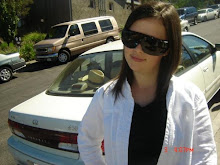 Like many girls, I grew up reading Judy Blume. She innately understood me, and I loved her in return. Blubber
Like many girls, I grew up reading Judy Blume. She innately understood me, and I loved her in return. BlubberThis book follows the titular Margaret over the course of one year at her new school. Having just moved from New York City to a suburb in New Jersey, Margaret is dealing with a lot of change. She's at the age when boys become a big deal and her friends begin to start their periods. And for some reason, everyone in her new town seems to care about what religion she is, something that never came up in the city. Margaret has been raised without a religion, her Jewish father and Christian mother having renounced their faiths when they married. But Margaret has a special, secret relationship with God, always starting their talks with the same line, "Are you there, God? It's me, Margaret." A year-long independent study project leads her to explore different religions, which ultimately ends in confusion.
Are You There, God? It's Me, Margaret. was published in 1970, but it doesn't seem all that dated to me. The hardships of young adulthood as Blume writes about them seem pretty universal. Who hasn't kept a secret of the boy she likes because her friends will disapprove? Who hasn't experienced that intense curiosity about how her body is changing? Who hasn't had a friend that makes her feel stupid? Who hasn't treated someone unfairly and felt guilty afterward? I went through the same experiences as Margaret, just 20 years later.
The only part that I didn't quite relate to was Margaret's search for religious meaning. I was raised Catholic, attended a Catholic school through eighth grade, and never really questioned my faith. I'm not really practicing now and there are issues on which I disagree with the Church, but it's a part of who I am. It's like having brown hair and not being able to read a map -- it's who I am. So it was interesting to read those parts of the book, and Blume makes it relatable for her readers. Even though I haven't been in a similar situation, I still felt like I could understand what Margaret was going through.
I whole-heartedly recommend this book to anyone like me who missed it the first time around or anyone who has a daughter to give a copy to. The hardest part of being Margaret's age is feeling like no one understands you, and this book will make anyone feel less alone.


2 comments:
I can't believe you had never read this. I am so glad you finally got around to it. This was definitely one of my favorites growing up. I read it many many times as a preteen, and several times as a grown up.
I know, I'm not quite sure how I missed it. So glad I finally read it!
Post a Comment